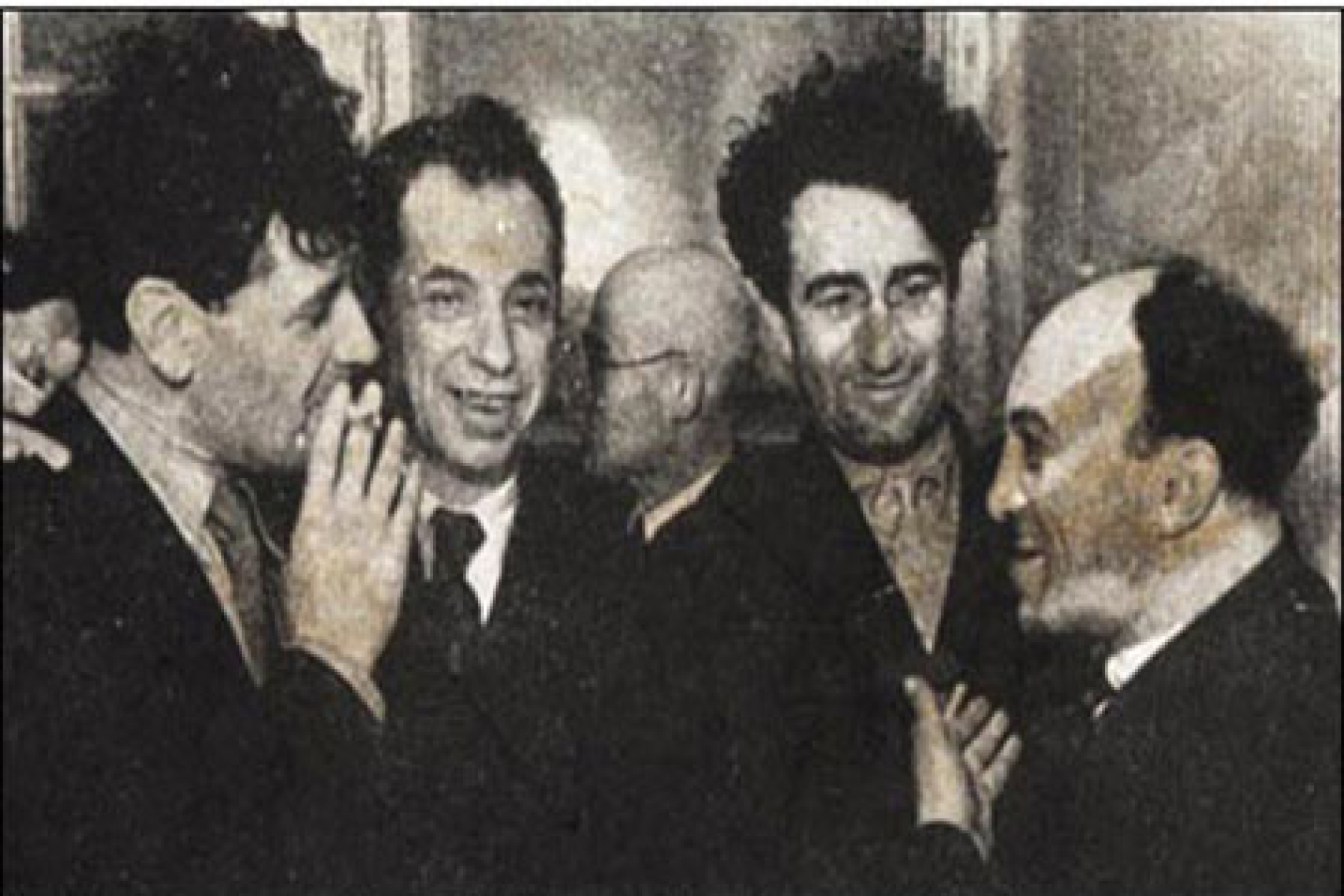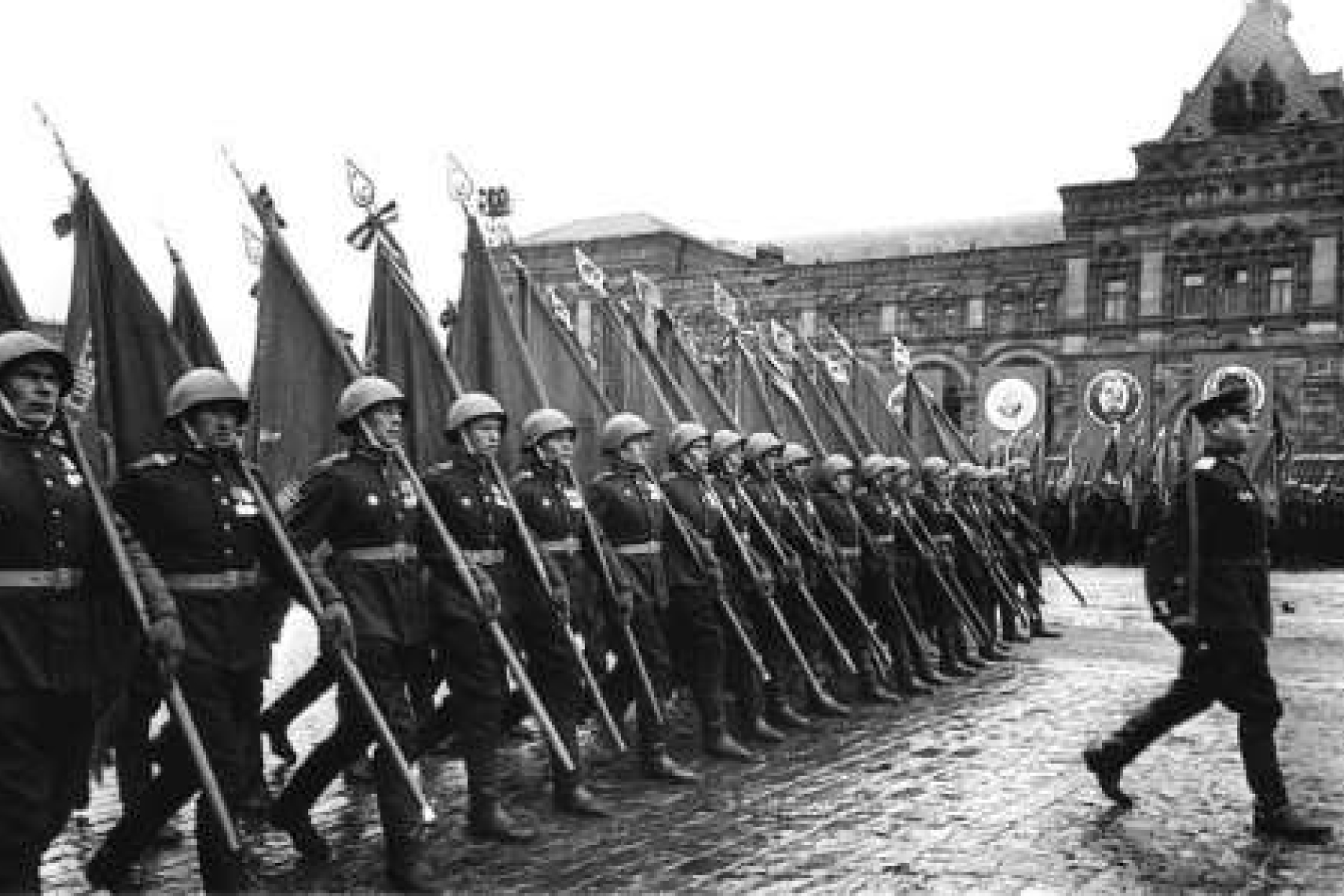Jewish Anti Fascist Committee (JAC) members were arrested and charged with treason starting in late 1948. They were accused of trying to establish a Jewish state in Crimea that would be loyal to Soviet enemies, in what became known as “The Crimean Affair”. “The Night of the Murdered Poets” refers to the execution of 13 Jewish artists, academics, and politicians on August 12th 1952, all charged in conjunction with “The Crimean Affair”. Soviet authorities would use the Crimean story to prosecute another 110 Jews before the end of Stalin’s reign in 1953, 10 were sentenced to death and the rest to hard labour. Everyone implicated in “The Crimean Affair” was rehabilitated in 1955 and The Soviet Union admitted to fabricating all the charges in 1989.

foreward.comDavid Bergelson (left),Peretz Markish (centre left),Izi Kharik (centre right – Yiddish poet killed in 1937 during The Great Purge), and Solomon Mikhoels (right)
13 of the 15 high profile Jews first sentenced to death in “The Crimean Affair” died on “The Night of the Murdered Poets”. All of them were in someway connected to The JAC. Yiddish poets Peretz Markish, David Hofstein, Itzik Fefer, and Leib Kvitko were killed along with, Benjamin Zuskin, Solomon Mikhoels’ successor as head of the Moscow State Yiddish Theatre. Fefer was a prominent JAC supporter who traveled to America on JAC’s behalf along with Mikhoels, during which time he was photographed with Mikhoels alongside Einstein.. Novelist David Bergelson, translators Leon Talmi, Emilia Teumin, and Khaya Vatenburg-Ostrovskaya, her husband, journalist Ilya Vatenberg and historian and trade unionist Joseph Yuzefovich were also shot after being accused of treason. Prominent medical doctor Boris Shimeliovich was also tried and killed. Even after being tortured, Shimeliovich never confessed to a single accusation. Solomon Lozovsky, former director of the Soviet Information Bureau and Deputy Commissar of Foreign Affairs, was technically the highest ranking victim and the most vocal in his defense. Solomon Bregman was Deputy minister of state control of the Russian Federation scheduled to die with the group of ‘murdered poets’ but fell into a coma and passed away in jail. Lina Stern, a leading Soviet scientist, was tried and convicted but her research was deemed too important to the state and she was spared execution.
Doctor’s Plot
The Doctor’s Plot was the culmination of Stalin’s post war antisemitic policies. The plot, a conspiracy manufactured to implicate Soviet Jewish physicians, can be traced to Andrei Zhdanov’s death in August 1948. Zhdanov was a high ranking party official and a close ally of Stalin’s who succumbed to a heart attack. In 1952 high-ranking Soviet officials in Stalin’s inner circle accused a group of mostly Jewish doctors of murdering Zhdanov as part of a Western-influenced plot to seize control of The Soviet Union. The conspiracy was based on a 1948 letter by Lidiia Timashuk, who was in charge of the Electrocardiography Laboratory at the Kremlin Hospital, warning Zhdanov’s doctors were improperly diagnosing his condition. Timushek’s accusations did not target Jewish doctors. In March 1951, well known Jewish physician and JAC member Yakov Eitinger died while being tortured in prison. His forced testimony alluded to a Jewish and American conspiracy to implicate murdering high ranking Soviet officials. By 1952 this testimony was used as the basis for arresting 37 other Jewish doctors and their immediate families on similar charges. Minister of State Security Viktor Abakumov was also arrested in late 1951 and accused of being a “Jewish sympathizer”, leading to many Jewish MGB (State Security Ministry) employees being fired or arrested throughout 1952.
These arrests were accompanied by a media campaign reviving antisemitic rhetoric from The Protocols of the Elders of Zion in September 1952. This served as an endorsement of Anti Jewish policies throughout the Soviet Union, significantly affecting the quality of life for Jews throughout the country. Solomon Mikhoels reappeared in the press, positioned as a key player in a “rootless cosmopolitan”, Zionist, or bourgeoisie plot to overthrown the Soviet Union by having Jewish doctors poison high ranking officials. The Doctor’s Plot contributed to a brief severing of diplomatic ties with Israel in early 1953, but relations resumed after Stalin’s death. The propaganda campaign continued into 1953. Many speculate that Stalin invented the plot to initiate another purge, similar to the one in 1936, with the Jewish conspiracy filling the same justifying role as Sergey Kirov’s murder. At the time there were also rumours that forced deportations of Soviet Jews were being organized, again using the Plot as justification, though no conclusive evidence to support this has come to light. After Stalin’s death in March 1953, Soviet officials admitted no Doctor’s Plot existed, though antisemitic policies lingered.

